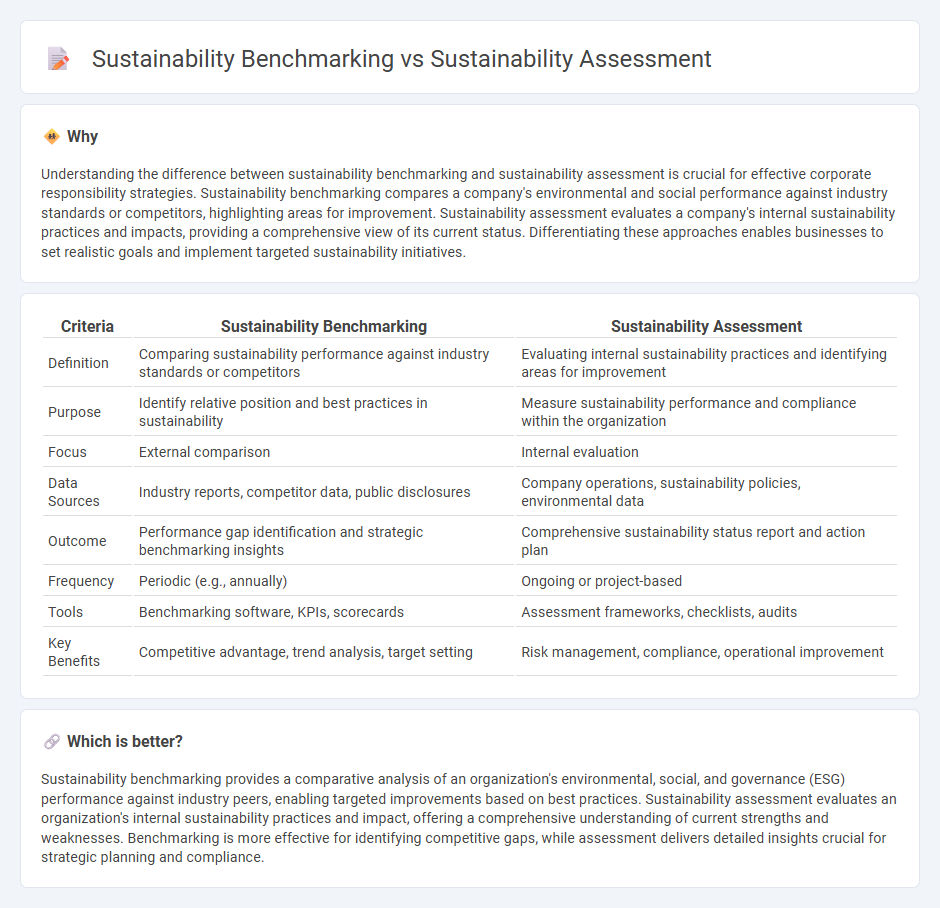
Sustainability benchmarking evaluates a company's performance by comparing its environmental, social, and governance (ESG) metrics against industry leaders and standards, providing a clear competitive landscape. Sustainability assessment delves deeper into internal processes, risks, and impacts to identify areas for improvement and compliance with regulations. Discover how leveraging both approaches can enhance your organization's sustainable growth and resilience.
Why it is important
Understanding the difference between sustainability benchmarking and sustainability assessment is crucial for effective corporate responsibility strategies. Sustainability benchmarking compares a company's environmental and social performance against industry standards or competitors, highlighting areas for improvement. Sustainability assessment evaluates a company's internal sustainability practices and impacts, providing a comprehensive view of its current status. Differentiating these approaches enables businesses to set realistic goals and implement targeted sustainability initiatives.
Comparison Table
| Criteria | Sustainability Benchmarking | Sustainability Assessment |
|---|---|---|
| Definition | Comparing sustainability performance against industry standards or competitors | Evaluating internal sustainability practices and identifying areas for improvement |
| Purpose | Identify relative position and best practices in sustainability | Measure sustainability performance and compliance within the organization |
| Focus | External comparison | Internal evaluation |
| Data Sources | Industry reports, competitor data, public disclosures | Company operations, sustainability policies, environmental data |
| Outcome | Performance gap identification and strategic benchmarking insights | Comprehensive sustainability status report and action plan |
| Frequency | Periodic (e.g., annually) | Ongoing or project-based |
| Tools | Benchmarking software, KPIs, scorecards | Assessment frameworks, checklists, audits |
| Key Benefits | Competitive advantage, trend analysis, target setting | Risk management, compliance, operational improvement |
Which is better?
Sustainability benchmarking provides a comparative analysis of an organization's environmental, social, and governance (ESG) performance against industry peers, enabling targeted improvements based on best practices. Sustainability assessment evaluates an organization's internal sustainability practices and impact, offering a comprehensive understanding of current strengths and weaknesses. Benchmarking is more effective for identifying competitive gaps, while assessment delivers detailed insights crucial for strategic planning and compliance.
Connection
Sustainability benchmarking establishes performance standards by comparing key environmental, social, and governance metrics across organizations, serving as a reference point for sustainability assessments. Sustainability assessment evaluates a company's current practices and impacts against these benchmarks to identify gaps, risks, and opportunities for improvement. Together, they enable informed decision-making and strategic planning to enhance sustainability performance in consulting projects.
Key Terms
Life Cycle Assessment (LCA)
Sustainability assessment evaluates the environmental impacts of products or processes throughout their Life Cycle Assessment (LCA), providing detailed insights into resource use, emissions, and waste generation. Sustainability benchmarking compares these LCA results against industry standards or competitors to identify performance gaps and improvement opportunities. Explore how integrating both approaches enhances sustainable decision-making and drives continuous environmental performance improvements.
Key Performance Indicators (KPIs)
Sustainability assessment evaluates an organization's environmental, social, and economic impacts through Key Performance Indicators (KPIs) to identify strengths and weaknesses. Sustainability benchmarking compares these KPIs against industry standards or competitors to gauge relative performance and uncover improvement opportunities. Explore more to understand how leveraging KPIs can drive effective sustainability strategies.
Industry Standards
Sustainability assessment involves evaluating a company's environmental, social, and governance (ESG) practices against predefined criteria, while sustainability benchmarking compares these practices directly against industry standards and competitors to identify gaps and best practices. Industry standards such as the Global Reporting Initiative (GRI), Science Based Targets initiative (SBTi), and ISO 14001 provide structured frameworks crucial for both assessment and benchmarking processes. Explore these methodologies to enhance your organization's sustainability performance and align with global industry standards.
Source and External Links
Green Metrics - Mastering Sustainability Assessment for a ... - A sustainability assessment is a tool companies use to evaluate their environmental impact, including carbon footprint, energy consumption, waste generation, and water usage, to identify and reduce their ecological footprint.
Sustainability Assessment - Uptime Institute's Sustainability Assessment helps organizations identify, track, and report on the sustainability of their digital infrastructure across all IT environments, providing a vendor-neutral, industry-accepted framework that considers global and regional requirements without compromising reliability.
Assess - PSAT/CSAT - The Program Sustainability Assessment Tool (PSAT) is a self-assessment for program staff and partners to evaluate sustainability capacity across eight domains, helping programs at various levels plan and improve their long-term viability.
 dowidth.com
dowidth.com